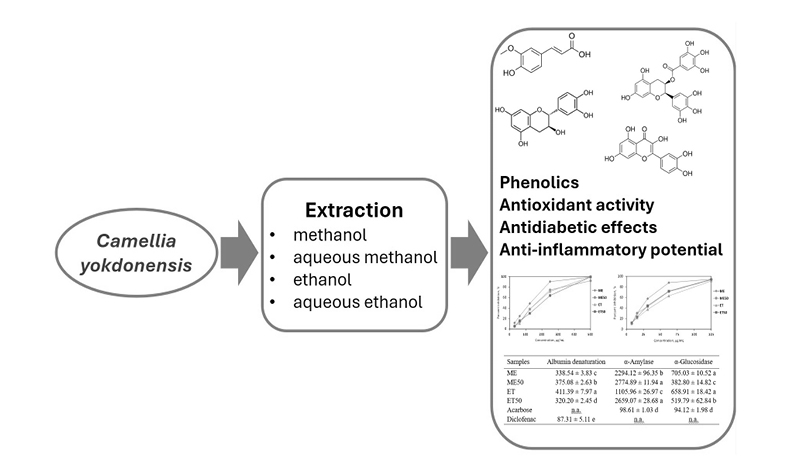Camellia Yokdonensis Leaves: Antioxidant, Potential Antidiabetic and In Vitro Anti-inflammatory Activities
DOI:
https://doi.org/10.17344/acsi.2025.9305Abstract
This study investigated the phenolic content, antioxidant activity, α-amylase and α-glucosidase inhibitory effects, and albumin denaturation inhibitory activity of extracts from the leaves of Camellia yokdonensis, a plant species native to Vietnam. The results revealed epigallocatechin gallate as the dominant phenolic compound (33.76–191.95 mg/g). The methanolic extract showed the most potent antioxidant activity (ABTS IC50 = 135.01 ± 1.51 μg/mL, DPPH IC50 = 25.96 ± 0.11 μg/mL). The aqueous ethanolic extract exhibited the strongest inhibitory activity against albumin denaturation (IC50 = 320.20 ± 2.45 μg/mL). The aqueous methanolic extract possessed the highest α-glucosidase inhibition (IC50 = 382.80 ± 14.82 μg/mL), while the ethanolic extract displayed the strongest α-amylase inhibition (IC50 = 1105.96 ± 26.97 μg/mL). Pearson correlation analysis indicated positive correlations between total phenolic content and antioxidant activity, and albumin denaturation inhibition. These findings underscore C. yokdonensis leaves as a promising source of natural antioxidants and enzyme inhibitors for managing diabetes and inflammation.

Downloads
Published
Issue
Section
License
Copyright (c) 2025 Nguyen Thi Trang, Pham M. Tuan, Danh C. Vu

This work is licensed under a Creative Commons Attribution 4.0 International License.
Except where otherwise noted, articles in this journal are published under the Creative Commons Attribution 4.0 International License
